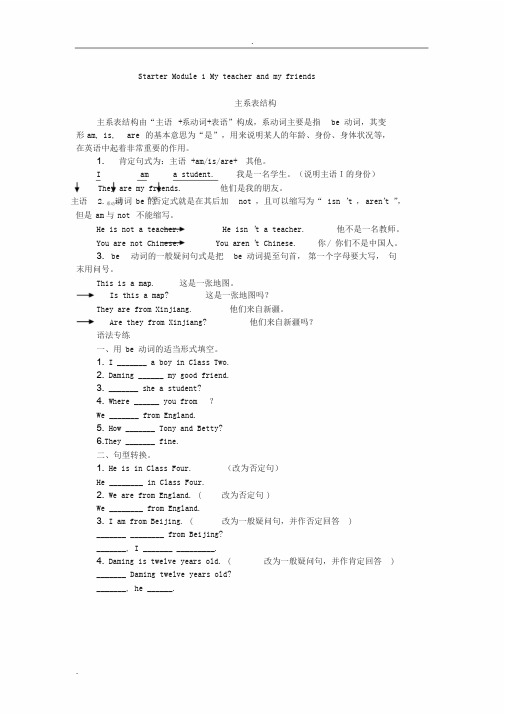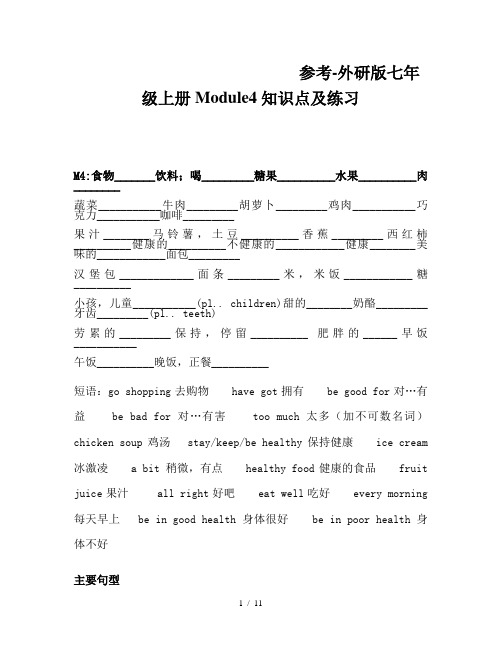【最新】外研版七年级英语上册Module4 模块语法精讲专练
外研版七年级上英语重点语法总结与练习

Starter Module 1 My teacher and my friends主系表结构主系表结构由“主语+系动词+表语”构成,系动词主要是指be 动词,其变形am, is, are 的基本意思为“是”,用来说明某人的年龄、身份、身体状况等,在英语中起着非常重要的作用。
1.肯定句式为:主语 +am/is/are+ 其他。
I am a student. 我是一名学生。
(说明主语I的身份)They are my friends. 他们是我的朋友。
主语 2.系动动词词 be表的语否定式就是在其后加not ,且可以缩写为“ isn ’t ,aren’t ”,但是am与not 不能缩写。
He is not a teacher. He isn ’t a teacher. 他不是一名教师。
You are not Chinese. You aren ’t Chinese. 你/ 你们不是中国人。
3.be 动词的一般疑问句式是把be 动词提至句首,第一个字母要大写,句末用问号。
This is a map. 这是一张地图。
Is this a map? 这是一张地图吗?They are from Xinjiang. 他们来自新疆。
Are they from Xinjiang? 他们来自新疆吗?语法专练一、用 be 动词的适当形式填空。
1. I _______ a boy in Class Two.2. Daming ______ my good friend.3. _______ she a student?4. Where ______ you from ?We _______ from England.5. How _______ Tony and Betty?6.They _______ fine.二、句型转换。
1. He is in Class Four. (改为否定句)He ________ in Class Four.2. We are from England. ( 改为否定句)We ________ from England.3. I am from Beijing. ( 改为一般疑问句,并作否定回答)_______ ________ from Beijing?_______, I _______ _________.4. Daming is twelve years old. ( 改为一般疑问句,并作肯定回答)_______ Daming twelve years old?_______, he ______.Starter Module 2 My English lesson祈使句2.祈使句可用来表示命令、请求和建议等意义的句子。
Starter+module+4同步知识讲与练 外研版英语七年级上册

Starter Module 4一、单词(英译汉)1.day ________2.today ________3.Monday ________4.Tuesday ________5.Wednesday ________6.Thursday ________7.Friday ________8.Saturday ________9.Sunday ________10.birthday ________11.favourite ________12.spring ________13.summer ________14.autumn ________15.winter ________16.warm ________17.hot ________18.cool ________19.cold ________20.weather ________21.like ________22.London ________23.basketball ________24.football ________25.swimming ________26.table tennis ________27.sport ________28.let ________ ________30.let’s = let us ________31.play ________32.after ________33.school ________34.idea ________二、知识点讲解what引导的特殊疑问句(1)询问姓名(2)询问某物用英语怎么说(3)询问电话号码(4)询问数量(5)询问某物或某事是什么(6)询问颜色、尺寸等(7)询问职业(8)询问时间、星期几等(9)询问天气同步检测一、单项选择1.— ________ is it today?— It’s Monday.A.What time B.When C.What day D.What’s day 2.— _________ is it tomorrow?— It's Sunday.A.What B.When C.What time D.What day 3.—What's your phone number?—________ 3874269.A.She's B.He's C.It's4.—_____.—His name is Mike.A.How are you?B.What's his name?C.How old is he?D. Where is he?5.—What day is it today?—________.A.Monday B.Summer C.May 1st D.5 o'clock6.—What ________ is the chair?—It’s red.A.name B.colour C.school D.number 7.— do you like for breakfast?—Two eggs and some milk.A.Where B.How C.What D.What’s 8.—What _______ do you like, Tony?—Basketball.A.class B.sport C.color D.number 9.—What’s your __________?—It’s 942381.A.number B.name C.friend D.school 10.—How’s the ________ here in winter?—It’s cold and snowy.A.day B.weather C.river D.park 二、句型转换1.That is a blue pen. (对画线部分提问)__________ __________ that?2.The key is yellow. (对画线部分提问)__________ __________ is the key?3.It is my_pencil_box.(对画线部分提问)________ ________it?4.My name is Bill Green. (对画线部分提问)__________ is your __________ name, Bill?5.His first name is Bob. (对画线部分提问)__________ his first name?6.Gina's jacket is yellow. (对画线部分提问)____ _____ ____Gina's jacket?7.That is a yellow key.(对画线部分提问)____ _____ that?8.My favorite subject is history.(对划线部分提问)________ ________favorite subject?三、完型填空Hello, my name’s Tina. This boy is my 1 Henry. I’m his sister. We love2 and we often go to the school sports club. Doing sports is good for3 health. And I4 it is also a good way to make friends(交朋友). I like5 . It’s interesting. I play it three times a week(星期). I6 five tennis balls and two tennis bats. And I have some books7 tennis. But Henry doesn’t like playing tennis. He thinks it’s8 . He likes basketball. He is good at9 it and he is on the school basketball team(队). 10 about you? Do you love sports? 1.A.cousin B.brother C.father D.friend 2.A.sports B.school C.family D.classes 3.A.his B.my C.their D.our4.A.see B.ask C.think D.thank 5.A.baseball B.basketball C.tennis D.soccer 6.A.have B.like C.say D.spell7.A.in B.for C.under D.about8.A.nice B.difficult C.welcome D.fun 9.A.playing B.meeting C.doing D.asking 10.A.When B.Who C.What D.Where。
外研版七年级上册英语 Module 4 Unit 3 Language in use

33. Fromtheform, youcangettheinformationof_______.A A. thepriceB. theaddress C. thetelephonenumberD. thenameofsoup
4. Thereissome______C__inthebottle(瓶子), andtherearesome________inthebag.
A. orange; orange
B. oranges; oranges
C. orange; orangesD. oranges; orange
【点拨】orange作“橙汁”讲, 是不可数名词, 作 “柑橘”讲, 是可数名词。
外研版七年级上
Module4Healthyfood
Unit3Languageinuse
习题链接
温馨提示:点击 进入讲评
1D
题组专训•突破考点
答案呈现
6 adressfor
2 Have; gotany 3A
4C
5 buysome
习题链接
1 bananas
课后巩固•拓展延伸
答案呈现
6 A 11 haven't; any
答案呈现
习题链接
课后巩固•拓展延伸
21 important
26 bad
22 healthy
27 children
23 for
28 well
24 bread
29 get
25 or
30 some
参考-外研版七年级上册Module4知识点及练习

参考-外研版七年级上册Module4知识点及练习M4:食物_______饮料;喝_________糖果__________水果__________肉________蔬菜___________牛肉_________胡萝卜_________鸡肉___________巧克力___________咖啡_________果汁________马铃薯,土豆__________香蕉_________西红柿__________健康的__________不健康的____________健康________美味的____________面包_________汉堡包_____________面条_________米,米饭____________糖__________小孩,儿童___________(pl.. children)甜的________奶酪_________牙齿_________(pl.. teeth)劳累的_________保持,停留__________ 肥胖的______早饭___________午饭__________晚饭,正餐__________短语:go shopping去购物 have got拥有 be good for对…有益 be bad for 对…有害 too much太多(加不可数名词)chicken soup鸡汤 stay/keep/be healthy保持健康 ice cream 冰激凌 a bit 稍微,有点 healthy food健康的食品 fruit juice果汁 all right好吧 eat well吃好 every morning 每天早上 be in good health身体很好 be in poor health身体不好主要句型1..We haven’t got any meat ..我们没有肉了。
2..—Have we got any chocolate? —Yes ,we have /No ,we haven’t..我们有巧克力吗?3..How about some orange juice?一些橘汁怎么样?what about =how about4..Is your food and drink healthy ?你的饮食健康吗?5..What’s your favourite food and drink? 你最喜欢的食物和饮料是什么?6..Meat and fish are healthy food ..肉和鱼是健康食品!7..Let’s go shopping for food and drink..我们去购物买些食物和饮料吧!8..Too much chocolate isn’t good for you ..吃太多巧克力对你的身体不好。
外研版英语七上Module 4重要单词语法点总结

七上Module 4 Healthy food1.food n.1.“食物,食品”,表示泛指的食物或食物总体时是不可数名词(在大多数情况下用)What's your favorite food? 你最喜欢的食物是什么?Let’s buy some . 我们去买些食物吧。
2.当表示特定的食品或某种类的食物时,为可数名词。
sea foods baby foods 婴儿食品frozen foods 冷冻食品 a favourite food最喜欢的食物There are all kinds of on the table. 桌子上有各种各样的食物。
2.drink n.1.意为“饮料”时,一般为名词。
Have you got any drink? 你有饮料吗?2.指不同种类的饮料时,为名词。
There are all kinds of drinks in the shop.Cola isn’t a healthy drink. 可乐不是一种健康的饮料。
3.还可指“一杯(饮料)”或“一份(饮料)”。
Let’s have a drink.Please give me a cold drink.【拓展】drink作动词,“”。
I don’t drink tea.You should drink more hot water.Would you like to drink some juice?1.I am thirsty, I need some .(drink)2.Mary often (drink) some milk for breakfast.3.candy n 糖果4.fruit n.1.“水果”,指水果总称时,为名词。
Do you like fruit? ( 泛指水果) 你喜欢水果吗?2.指水果的种类或个别水果时,是名词。
I like to eat apples, bananas and other fruits. ( 强调种类用fruits ) 我喜欢吃苹果、香蕉及其他水果。
2023年中考备考英语学科总复习外研版:(精讲精练)七年级上册Module 1-4

2023年中考备考英语学科总复习—外研版七年级上册Module1-4考点一:Good.Hello,what about you?很好。
你好,你呢?【考点精讲】What/How about…?句型What about...?=How about...?意为“……怎么样?”,about为介词,后面跟名词、代词或动名词。
常见用法如下:►用于提出建议。
如:What/How about sth.?某事/物怎么样?What/How about doing sth.?做某事怎么样?常用肯定答语:Good idea./Sounds great/good./OK./All right.常用否定答语:Sorry,I.../Sorry,but.../I'm afraid.../I'd love/like to,but...►用于询问对方的情况或看法。
如:I like watching Readers.What about you?我喜欢看《朗读者》。
你呢?考点二:Who are the boy and the girl in front of Paul?保罗前面的男孩和女孩是谁?【考点精讲】辨析in front of,in the front of与in front图示用法in front of表示位置“在……(外部)的前面”。
……考点三:Gao Yan's in front of Daming and between Zhao Feng and Li Min.高燕在大明前面,赵峰和李敏之间。
考点四:Too much chocolate isn't good for you.吃太多巧克力对你不好。
【考点精讲】辨析too much,too many与much too辨析含义及用法示例too much 太多的,中心词是much,后接不可数名词。
too much work太多的工作too many 太多的,中心词是many,后接可数名词复数。
外研版七年级上册Module4 同步知识点和练习(含答案)
七年级上册module4同步练习一、重点词汇1.candy n. 糖果复数:candies2.potato n. 马铃薯,土豆复数:potatoes3.tomato n. 西红柿,番茄复数:tomatoes4.have 有,吃,喝第三人称单数has,过去式had,现在分词having5.get 得到过去式got,现在分词getting6.bad adj. 坏的,不好的反义词:good7.healthy adj. 健康的反义词:health8.eat 吃过去式ate,现在分词eating9.right adj. 正确的,对的反义词:wrong10.buy 买第三人称单数buys,过去式bought,现在分词buying二、短语积累1.go shopping 去购物2.have got 有3.too much 太多4.be good for 对……好5.lots of = a lot of 许多,大量6.how about 怎么样,好吗,行吗7.good idea 好主意8.all right 好吧,好的9.be bad for = be not good for 对……不好10.a bit 稍微,有点儿11.stay healthy 保持健康12.have a good breakfast 吃一个好早餐13.every morning 每天早上三、佳句必背1.Tony, let’s go shopping for food and drink. Tony,我们去买食物和饮料吧。
2.Have we got any chocolate? 我们有一些巧克力吗?3.Too much chocolate isn’t good for you. 吃太多巧克力对你不好。
4.How about some orange juice? 买一些橘子汁好吗?5.Meat is healthy but too much meat is not good for children. 肉是健康的,但是吃太多肉对孩子们不好。
七年级英语上册(外研版)素材 Module.4 模块语法聚焦四
Module4Healthy food模块语法聚焦四have/has got的用法一、句式结构:1.肯定句:主语+have/has got…若主语为第一人称(I, we)、第二人称(you)、第三人称复数(they)及复数名词时,要用__ha v e__got;若主语为第三人称单数(he, she, it)或单数名词时,要用__has__ got。
例如:We have got a new friend. 我们有一个新朋友。
His brother has got a cat. 他弟弟有一只猫。
2.否定句:变否定句时,在have/has后面加__not__。
have not可缩写为__ha v en't__;has not 可缩写为__hasn't__。
例如:They have not (haven't) got a big house.他们没有一所大房子。
His brother has not (hasn't) got a new bike.他的弟弟没有一辆新自行车。
3.一般疑问句:只需将__ha v e/has__ 提至句首就可以变为一般疑问句。
回答时也要借助助动词have或has来完成。
例如:—__Ha v e__ you got a football?—Yes, I have./No, I haven't.“你有足球吗?”“是的,我有。
”/“不,我没有。
”二、与there be 句型的区别:there be 句型表示“某地存在某物/人”,have/has got表示“某人/物拥有……”。
例如:There is a football under the bed.床底下有一个足球。
(存在于床下)I have got two ears. 我有两只耳朵。
(属于我)三、have/has与have/has got的区别:1.相同点:两者都表示“有”,只是美国人习惯于用have/has表达这一意思,而英国人常用__ha v e/has_got__ 来表达。
外研版英语七年级上册Module 4 语法学习 (have got 和 名词)
鸡肉
orange 橘子
橘子汁
2) 抽象名词是指表示动作、状态、 品质、感情等抽象概念的词。
e.g. work (工作), homework (作业) love (爱), friendship (友谊)等。
3. fish fish可作可数名词,意思是“鱼”, 复数形式仍为fish。
e.g. My grandmother has got a / three fish. 我奶奶养了一条/ 三条鱼。
2) 以s, sh, ch, x等结尾加 –es e.g. bus- buses
watch- watches box- boxes brush- brushes
3) 以辅音字母+y结尾, 去y加 ies, e.g. baby---babies city-cities
library-libraries 元音字母+y 结尾的名词变复数时, 直接加s变复数。 e.g. monkey---monkeys
(1) There are lots of fish in this pond. __n_._鱼__________
(2) Betty’s brother can fish. _v_._钓__鱼_______
(3) I like eating rice with fish for lunch. _n_._鱼__肉________
男生 PK 女生: 在黑板上写下可数名词和不可数名词, the more, the better!(多多益善)
注意:有些名词既能用作可数名词,又能用作不可 数名词,但意义不同。
单词 可数
不可数
paper 报纸,试卷,文件 纸
glass 玻璃杯
玻璃
room 房间
外研英语七年级上Module4重要词句讲解 习题 有答案
七上Module 4 Healthy Food 一、课内基础必背词汇food [fu:d] n. 食物;食品drink [driŋk] n. 饮料;vt. 喝candy ['kændi] n. 糖果(等于sweets);fruit [fru:t] n. 水果;产物meat [mi:t] n. 肉,肉类(食用)vegetable ['vedʒitəbl] n. 蔬菜apple ['æpl] n. 苹果bean [bi:n] n. 豆beef [bi:f] n. 牛肉carrot ['kærət] n. 胡萝卜chicken ['tʃikin] n. 鸡肉;小鸡chocolate ['tʃɔkəlit] n. 巧克力coffee ['kɔfi] n. 咖啡;咖啡豆;juice [dʒu:s] n. (水果)汁,果汁milk [milk] n. 牛奶potato [pə'teitəu] n. 土豆,马铃薯tea [ti:] n. 茶叶;茶树tomato [tə'mɑ:təu] n. 番茄,西红柿water ['wɔ:tə] n. 水shop [ʃɔp] vi. 购物;买东西have [hæv, həv] aux. 助动词。
vt. 有,吃,喝get [ɡet] vt. 得到;获得some [sʌm] adj. 一些;若干;少量。
pron. 一些;某些much [mʌtʃ] adj. 大量的,许多。
kind [kaind] n. 种类;healthy ['helθi] adj. 健康的delicious [di'liʃəs] adj. 美味的bread [bred] n. 面包;fish [fiʃ] n. 鱼,鱼类hamburger ['hæmbə:ɡə] n. 汉堡包,汉堡ice cream [,ais'kri:m] 冰淇淋noodle ['nu:dl] n. 面条;[俚]笨蛋rice [rais] n. 稻;米饭sugar ['ʃuɡə] n. 糖;食糖eat [i:t] v. 吃child [tʃaild] n. (14岁以下的)儿童,孩子sweet [swi:t] adj. 甜的right [rait] adj. 正确的,对的egg [eɡ] n. 蛋;鸡蛋eye [ai] n. 眼睛;视力cheese [tʃi:z] n. 奶酪;干酪tooth [tu:θ] n. 牙齿tired ['taiəd] adj. 劳累的soup [su:p] n. 汤,羹important [im'pɔ:tənt] adj. 重要的,重大的remember [ri'membə] vi. 记住,记起well [wel] adv. 很好地stay [stei] v. 停留;保持fat [fæt] adj. 肥的,胖的or [ɔ:] conj. 或,或者breakfast ['brekfəst] n. 早餐,早饭every ['evri] adj. 每一的,每个的lunch [lʌntʃ] n. 午餐home [həum] n.家;家庭dinner ['dinə] n. 晚餐,正餐buy [bai] v. 买必背短语1. go shopping 去购物2. have got to 不得不3. too much 太多4. what kind 什么种类5. how about ……怎么样6. stay healthy 保持健康7. be good for 对……有好处8. be bad for 对……有害9. a bit 一点儿10. get fat 变胖11. have a good breakfast 吃个很好的早餐经典句型1. Tony, let’s go shopping for food and drink.托尼,我们去买点食物和饮料吧。
